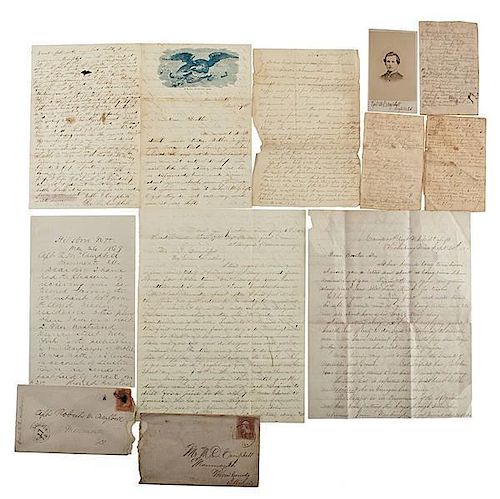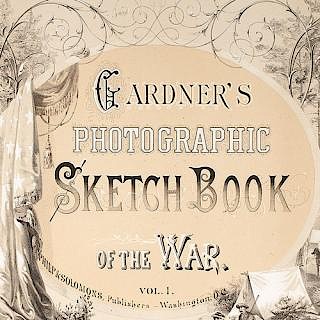Robert M. Campbell, 17th Illinois & 47th USCT, Civil War Archive
About Seller
6270 Este Ave.
Cincinnati , OH 45232
United States
With offices in Cincinnati, Cleveland and Denver, Cowan’s holds over 40 auctions each year, with annual sales exceeding $16M. We reach buyers around the globe, and take pride in our reputation for integrity, customer service and great results. A full-service house, Cowan’s Auctions specializes in Am...Read more
Two ways to bid:
- Leave a max absentee bid and the platform will bid on your behalf up to your maximum bid during the live auction.
- Bid live during the auction and your bids will be submitted real-time to the auctioneer.
Bid Increments
| Price | Bid Increment |
|---|---|
| $0 | $25 |
| $500 | $50 |
| $1,000 | $100 |
| $2,000 | $250 |
| $5,000 | $500 |
| $10,000 | $1,000 |
| $20,000 | $2,500 |
| $50,000 | $5,000 |
| $100,000 | $10,000 |
About Auction
Nov 21, 2014 - Nov 22, 2014
Cowan's Auctions dawnie@cowans.com
- Lot Description
Robert M. Campbell, 17th Illinois & 47th USCT, Civil War Archive
The lot includes correspondence related to Robert M. Campbell, accompanied by a CDV signed by Campbell as Captain, with backmark of D.P. Barr, Army Photographer. Palace of Art. Vicksburg, Mississippi.
The correspondence includes: four leaves (eight pages) detached from a pocket diary (3 x 4.5 in.), covering the period of April 6 to May 18, 1862. The first page and part of the second are the most significant (his spelling retained):
Sabbath April 6th 1862
We were surprised by the Enemy early this morning. They advanced in large force under Gen Johnson [sic - Albert Sidney Johnston] & Beaureguard. Surprised our army under Gen. Grant and forced our lines back for one mile taking possession of our camps. Our Regt fought well losed a large lot of men, had two killed in our Co. F. Thume [Frederick] & F. Olert [Ferdinand] Had 6 wounded. We were reinforced by Buell about dark. I was on guard all night.
Monday Apr 7th 62
We were ordered forward. The enemy fell back. We routed them __ist. It was done by hard fighting. Our Regt was in Col. Marsh Bry__ _____ brought up in front of a large force run them… we came back to our camp found everything torn up & destroyed _____ my diary.
Tuesday Apr. 8
Were called out in line but false alarm. Raining today. The report of or [our] killed & Wounded were Killed 16 Wounded 114. Our Co. 2 Killed 7
Wounded….
By about the 24th of April they moved to a new camp. Things were reasonably quiet (for a war) for the next month.
The lot also includes a number of documents that make up the life of a captain, including 20 rosters of issues and returns of clothing, equipment and ordnance for early 1865 - Feb. (6), March (4), April (2), and May (7), plus a 4th Quarter muster and pay roll. The first two months found the 47th USCT in Barrancas, FL; by April they had moved to Mobile, AL; May found them still in Mobile, but by the end of the month they were in New Orleans on their way to Texas. The 47th was on garrison duty in Texas until the end of the year, then mustered out in Jan. 1866.
The three letters from Capt. Campbell include: 3pp, Camp 47th Regt. U.S. Cold. Inft., Vicksburg, Miss. Sept 20th, 1864. To his brother, Alex. He tells his younger brother that he is doing well, and tells him to study hard in school so he can write a long letter. Later he includes an extract from a circular read to his unit, the circular ordered by Maj. Gen. N.J.T. Dana. He quotes from a communication received from Col. Kerr, another commander of a colored unit, who wrote:
'I find the health of the colored troops is much better than that of the white: but am unable to assign any reason therefore. I also feel it my duty to report that in respect shown and attention to saluting officers and in the details of camp life the colored troops of this command exceed the white.' The favorable reason of difference in the health mentioned in Colonel Kerr’s report is on acct of greater attention being paid to duty by officers of colo[red regts] than officers of white Regiments. By order of Maj. Gen. N.J.T. Dana. {Damage to last page with significant paper loss.}
In a short 1p letter that is only dated "Tuesday morning 14" (they were in Barrancas, FL), he describes the rain. It seemed to never stop, and he was having trouble finding a place dry to write. However (probably after a few of his own "mud marches" over the years in service), Let it rain all the time. Still we have no mud. The water soaks into the sand as fast as it falls.
The first letter includes a cover addressed to Mr. M.D. Campbell, Monmouth, Warren county, Illinois.
Camp near Jackson Tenn. July 6th 1862. He tells his father that they thought they were being sent east, but it was a false alarm…we have not gone yet [to Washington, DC] nor do I expect we will go now unless our Eastern Army fails to do aney thing then I suppose they will call on the western boys to go and do the fighting for them. Well we have spent an other 4th in the army and rather a dull one….He goes on to describe the drill competition that was held…our band boys started home on the 4th they lossed there horns at the Battle of Shilo and were mustered out last week. We have aney amount of Black Berries. Some of our mess are out about every day we have lots of pies. We have had rine apples, pears & Peaches. There will be aney amount of ripe fruit here soon. He goes on to tell his father the few papers they have access to and requests a couple from home occasionally.
The last family letter is from Esther Campbell to her brother, Robert. 4pp on patriotic stationery, only dated May 29th. Mostly family news, but at the beginning she notes: Mother is giving you Jesse about having your hair sheared, she says not to come home if you have it cut. I do hope you will take her advice, and not be so disfigured.
The last letter also has its cover addressed to Capt. R.M. Campbell, Monmouth, IL. The letter is 2pp from General C.C. (Christopher Columbus) Andrews. The General tells Campbell to address inquiries regarding his book about the "Campaign of Mobile" to D. Van Nostrand, New York, and notes that the publication was rather expensive on account of illustrations, &c. (Andrews, C.C. "History of the Campaign of Mobile." New York: D. Van Nostrand, 1867)
Born in 1829, Christopher Columbus Andrews studied law, and was admitted to the bar in 1850. He moved to Minnesota near the end of the decade, and in 1859 was elected to the senate from his adopted state. When the war broke out, he enlisted as a private but was soon commissioned as a Captain. He surrendered at Murfreesboro and secured an exchange in October 1862. After this he rose through the ranks to Brig. Gen., serving in campaigns that resulted in the capture of Little Rock, AR, and the siege of Ft. Blakely, AL. The latter engagement is mentioned in the letter, as Andrews returned to Blakely and spent a week studying the battlefield and mapping it for the book. After Lee's surrender, he was sent to Texas to set it up for the Reconstruction governor, mustering out in Jan. 1866. After the war, he returned to politics, serving as minister to Sweden and consul-general to Brazil. He also authored a number of historical and political works (including books about Sweden and Brazil). He died in St. Paul, MN, in 1922.
Not a lot is known about Robert Campbell. He seems to be a native of Monmouth, IL. He enlisted in the 17th IL Vols. in May 1861 after Lincoln's first call. In August 1863 he was discharged for promotion to the 47th USCT and commissioned Captain of Co. F. The 17th Illinois spent most of its time in the Western Theater. The 47th USCT was sent south. They also mustered out in Jan. 1866. Campbell was active in the GAR and died in Peoria in 1932.Letters are better than average, with expected folds. The primary exception is the one with the torn last page as noted above. Cdv is excellent.Condition
- Shipping Info
-
SHIPPING. At the request of the buyer, Cowan's will authorize the shipment of purchased items. Shipments usually occur within two weeks after payment has been received. Shipment is generally made via UPS Ground service. Unless buyer gives special instructions, the shipping method shall be at the sole discretion of Cowan's Auctions, Inc.. Cowan's is in no way responsible for the acts or omissions of independent handlers, packers or shippers of purchased items or for any loss, damage or delay from the packing or shipping of any property.
-
- Buyer's Premium



 EUR
EUR CAD
CAD AUD
AUD GBP
GBP MXN
MXN HKD
HKD CNY
CNY MYR
MYR SEK
SEK SGD
SGD CHF
CHF THB
THB




